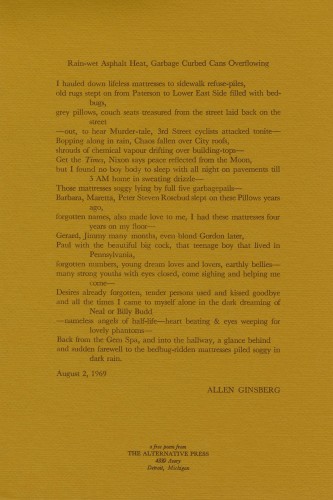How did prominent east coast poets like Allen Ginsberg, Ted Berrigan, and Anne Waldman end up contributing their work to The Alternative Press, a small press based in Michigan? It all started with John Sinclair.
Sinclair--writer, activist, and in the 1960s manager of the Detroit band MC5--was arrested for possession of marijuana in 1969. For two joints he was sentenced to ten years in prison. This sparked widespread outrage and several protests, most notably the John Sinclair Freedom Rally, held in December 1971 at Crisler Arena, three days before Sinclair was released from prison.
Allen Ginsberg first came to Detroit in 1969 to raise money for Sinclair’s defense fund. He needed a place to stay, and heard about a couple who had just started printing in their basement. Ann and Ken Mikolowski, founders of The Alternative Press, let Ginsberg stay with them and showed him the 1904 Chandler & Price letterpress they were using to print poetry broadsides. Ginsberg was impressed. He gave the Mikolowskis a poem to make into a broadside: "Rain-wet Asphalt Heat, Garbage Curbed Cans Overflowing" (1970). The typewritten draft was annotated with notes on how to set the poem; Ginsberg would have been well-assured the press would make every effort to get the typesetting exactly right.

Allen Ginsberg, "Rain-wet Asphalt Heat, Garbage Curbed Cans Overflowing" (1970)
Ginsberg went back to New York, and proceeded to tell all his friends about the couple he stayed with in Detroit and their basement print shop. The word about The Alternative Press spread. Before long, the Mikolowskis were printing work by poets like Diane di Prima, Robert Creeley, and Amiri Baraka alongside the core of Detroit artists and writers they started their press to publish. The breadth of contributors in The Alternative Press’s mailings resulted in a subscriber list that allowed them to keep printing for decades, and created a unique venue for Detroit-based artists and writers to be in conversation with voices from around the country.
As for Ginsberg, he continued to periodically contribute to the press, and in 1974 he wrote in praise of the press that “the attention given to each poem made it possible, were it a good poem, to see it as an isolated mental event--having a small perfectly defined place in a world gone mad with monster breakable petrochemical machines.” He continued with the prediction that “Detroit’s Alternative Press products will outlast the auto industry.” While the press published its last issue in 2006, The Alternative Press Records will be around for many years to come.
To see the Ginsberg's broadside and typewritten draft, and learn much more about The Alternative Press, visit the exhibit Free Poems and Functional Art: 50 Years of The Alternative Press, on view in Hatcher Graduate Library’s Audubon Room through June 2.